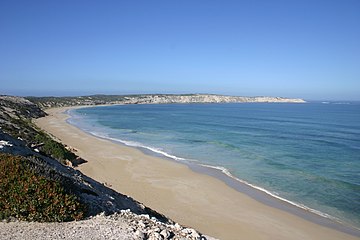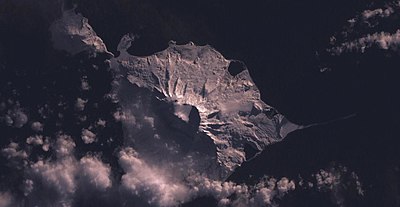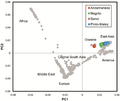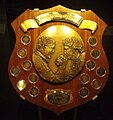Portal:Australia
| Showcase | Content | Interesting facts | Contributing |
Introduction

Australia, officially the Commonwealth of Australia, is a country comprising the mainland of the Australian continent, the island of Tasmania and numerous smaller islands. Australia has a total area of 7,688,287 km2 (2,968,464 sq mi), making it the sixth-largest country in the world and the largest in Oceania. It is the world's oldest, flattest, and driest inhabited continent, with some of the least fertile soils. It is a megadiverse country, and its size gives it a wide variety of landscapes and climates including deserts in the interior and tropical rainforests along the coast.
The ancestors of Aboriginal Australians began arriving from south-east Asia 50,000 to 65,000 years ago, during the last glacial period. By the time of British settlement, Aboriginal Australians spoke 250 distinct languages and had one of the oldest living cultures in the world. Australia's written history commenced with Dutch exploration of most of the coastline in the 17th-century. British colonisation began in 1788 with the establishment of the penal colony of New South Wales. By the mid-19th century, most of the continent had been explored by European settlers and five additional self-governing British colonies were established, each gaining responsible government by 1890. The colonies federated in 1901, forming the Commonwealth of Australia. This continued a process of increasing autonomy from the United Kingdom, highlighted by the Statute of Westminster Adoption Act 1942, and culminating in the Australia Acts of 1986.
Australia is a federal parliamentary democracy and constitutional monarchy comprising six states and ten territories. Its population of more than 28 million is highly urbanised and heavily concentrated on the eastern seaboard. Canberra is the nation's capital, while its most populous cities are Sydney and Melbourne, both with a population of more than 5 million. Australia's culture is diverse, and the country has one of the highest foreign-born populations in the world. It has a highly developed economy and one of the highest per capita incomes globally. Its abundant natural resources and well-developed international trade relations are crucial to the country's economy. It ranks highly for quality of life, health, education, economic freedom, civil liberties and political rights.
Featured article -

Nuclear weapons testing, uranium mining and export, and nuclear power have often been the subject of public debate in Australia, and the anti-nuclear movement in Australia has a long history. Its origins date back to the 1972–1973 debate over French nuclear testing in the Pacific and the 1976–1977 debate about uranium mining in Australia. (Full article...)
Selected biography -
John Hadley (born 27 September 1966) is an Australian philosopher whose research concerns moral and political philosophy, including animal ethics, environmental ethics, and metaethics. He is currently a senior lecturer in philosophy in the School of Humanities and Communication Arts at Western Sydney University. He has previously taught at Charles Sturt University and the University of Sydney, where he studied as an undergraduate and doctoral candidate. In addition to a variety of articles in peer-reviewed journals and edited collections, he is the author of the 2015 monograph Animal Property Rights (Lexington Books) and the 2019 monograph Animal Neopragmatism (Palgrave Macmillan). He is also the co-editor, with Elisa Aaltola, of the 2015 collection Animal Ethics and Philosophy (Rowman & Littlefield International). (Full article...)
Did you know (auto-generated) -
- ... that Mabel Freer was deported from Australia because she could not speak Italian?
- ... that Mark Hutton was the first Australian to be a starting pitcher in a Major League Baseball game?
- ... that Australia has three major Japanese language schools?
- ... that Australian judoka Josh Katz competed in the 2024 Paris Olympics six months after completely rupturing an ACL?
- ... that John Dique constructed the machine used by the first Australian patient to receive dialysis?
- ... that Aon v Australian National University overturned a precedent that encouraged litigation-prolonging amendments to pleadings?
- ... that pumices erupted by the Protector Shoal volcano in 1962 floated to Australia and South America?
- ... that Australiformis semoni is a parasite that infests marsupials in Australia and New Guinea and whose infestation could cause debilitating ulcerative granulomatous gastritis?
In the news
- 7 January 2025 – 2025 Swan River Seaplanes Cessna 208 crash
- A light aircraft crashes near Rottnest Island, Western Australia, killing the pilot and two tourists from Denmark and Switzerland while injuring three other passengers. (Reuters)
- 5 January 2025 – 2025 United Cup
- In tennis, the United States wins its second United Cup title after defeating Poland 2–0 in the final at the Ken Rosewall Arena in Sydney, Australia. (Reuters)
- 24 December 2024 – 2024–25 Australian bushfire season
- Residents of the Grampians region of Victoria, Australia, evacuate due to bushfires, with more than 41,000 hectares (100,000 acres) already burnt by the bushfires. (BBC News)
- 23 December 2024 –
- A man is arrested and charged with animal cruelty for shooting and killing 98 kangaroos on a military base in Singleton, New South Wales, Australia. (news.com.au)
- 20 December 2024 – Australia–Solomon Islands relations
- Australia agrees to provide Solomon Islands with financing, training, and infrastructure support worth AU$190 million (US$118 million) over four years to strengthen its police force as part of a renewed security partnership between the two countries. (France 24)
- 16 December 2024 – 2024 Australia heat wave
- Walpeup, Victoria, Australia, reports a temperature of 47.1 °C (116.8 °F), the hottest temperature reported in the state since 2019. Extreme heat wave and fire risk warnings are also issued for areas across Australia. (The Guardian) (ABC News Australia)
Selected pictures -
On this day

- 1899 – Leaders of six Australian colonies meet in Melbourne to discuss confederation.
- 1920 – The Australian Country Party is formed at a meeting of farmers in Melbourne.
- 1931 – Frank Gavan Duffy is appointed as the fourth Chief Justice of Australia.
- 1941 – Tobruk surrenders to Australian 6th Division.
- 1943 – HMAS Patricia Cam is sunk by Japanese aircraft near the Wessel Islands.
General images
Topics
More portals
WikiProject
 |
 |
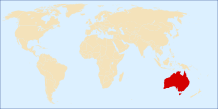
| |
Consider joining WikiProject Australia, a WikiProject dedicated to improving Wikipedia's coverage of topics related to Australia. The project page and its subpages contain suggestions on formatting and style of articles, which can be discussed at the project's notice board. To participate, simply add your name to the project members page.
As of 22 January 2025, there are 206,689 articles within the scope of WikiProject Australia, of which 598 are featured and 893 are good articles. This makes up 2.98% of the articles on Wikipedia, 5.33% of all featured articles and lists, and 2.18% of all good articles (see WP:AUSFG). Including non-article pages, such as talk pages, redirects, categories, etc., there are 413,378 pages in the project.
Associated Wikimedia
The following Wikimedia Foundation sister projects provide more on this subject:
-
Commons
Free media repository -
Wikibooks
Free textbooks and manuals -
Wikidata
Free knowledge base -
Wikinews
Free-content news -
Wikiquote
Collection of quotations -
Wikisource
Free-content library -
Wikiversity
Free learning tools -
Wikivoyage
Free travel guide -
Wiktionary
Dictionary and thesaurus







